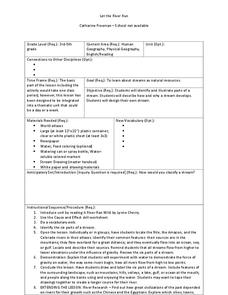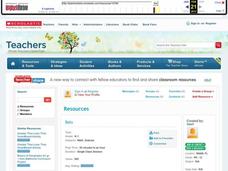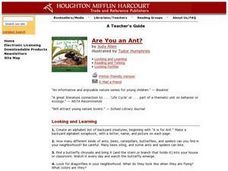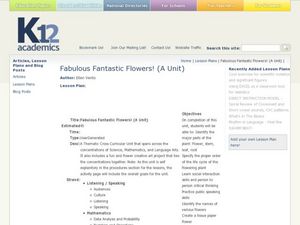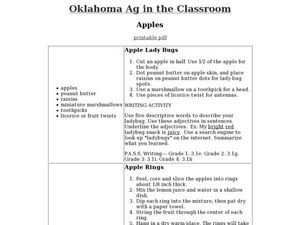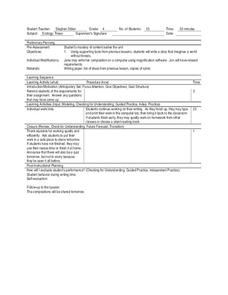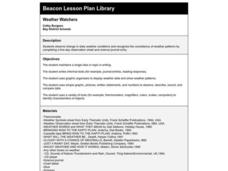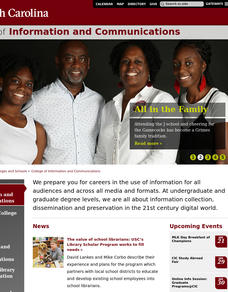American Chemical Society
The Discovery of Fullerenes
Carbon is the most common element on earth, so the innovative discovery of a new type of carbon molecule won the 1996 Nobel Prize. In the ready-to-go lesson, scholars learn about C60 and how it has opened up the entire area of...
Curated OER
Earth's Poles
In this Earth's Poles worksheet, students survey, examine and dissect the North and South Magnetic Poles, the Earth's axis and summarize the Aurora legends. Students research six directives involving space weather and predicting answers.
Curated OER
Let the River Run
Students explore the environment by reading a story in class. In this water formation lesson, students define environmental terms such as rivers, streams, gulf, oceans and lakes. Students read the story A River Ran Wild and discuss the...
Curated OER
Bats
Learners investigate bats. In this animal science lesson, students use several websites and suggested bat books to write an informative paragraph. Learners should be able to write with 90% accuracy.
New York State Education Department
US History and Government Examination: January 2018
It's time to test those skills! Assess pupils' knowledge of US history and government with short answer questions, multiple-choice items, and essays. The resource serves as a standardized test that functions well for a final exam....
Council for the Curriculum, Examinations and Assessment
Victorian Historians
Take the class back in time to the Victorian Era! The resource provides a plethora of activities that create experiences for scholars in class. Some activities include a fun fair, viewing the starry-night painting, and even experiencing...
Curated OER
Beary O'Mometer Learns About Careers In Meteorology
Young scholars explore the field of meteorology. In this meteorology lesson, students explore weather-related careers as they research the field of study as well as various weather concepts. Young scholars interview meteorologists, write...
Curated OER
Celebrating Our Connections Through Water
Students examine the role of water in ceremonies around the world. For this world history lesson, students explore how other cultures celebrate water. They create a Water Day for younger students to participate in.
Curated OER
Are You an Ant?
Young scholars investigate different insects in their backyard. In this insect lesson, students read the book Are You and Ant? and apply the reading to their backyards. Young scholars create a list of animals that begin with the the...
Curated OER
The Great Kapok Tree Debate
Young scholars participate in a read aloud of the story, "The Great Kapok Tree" in which a logger decides not to cut down a tree. In small groups, they discuss and write about their opinion on the logger's decision. Each group then...
Curated OER
Photosynthesis
Fourth graders discuss and identify the components of photosynthesis and the products of this process. They participate in a class discussion about the importance of oxygen, and in small groups act out the process of photosynthesis. ...
Curated OER
Fabulous Fantastic Flowers!
Students study flowers and identify their major parts. In this flowers lesson plan, students research flowers, learn about their life cycle, label their major parts, and make tissue paper flowers.
Curated OER
From Seeds to Plants
Second graders review the process of plant reproduction and the role of seeds in that process. The students dissect a seed, analyze their finds, collect and record data, and make predictions about seed germination and plant growth.
Curated OER
Symposia: Scholarly Parties
Students hold a symposium during which students debate the benefits of democracy in ancient Greece and the United States. By doing this, students explain the role of symposia in ancient Greek culture and politics.
Curated OER
Apples
Second graders complete many cross categorical activities about apples. In this apples lesson plan, 2nd graders cook with apples, make a mobile, finger-paint, write a story about apples, and more. Students read poetry and complete math...
Curated OER
Volcanoes
Third graders study the concept of plate tectonics. In the process they embark in research and construction of a volcano. They complete a web quest while assessing how to research, give oral reports, and create a product.
Curated OER
Park Brochures
Sixth graders investigate natural environments by researching national parks. In this brochure making lesson plan, 6th graders explore a specific national park and research it's information by utilizing the web. Students create travel...
Curated OER
Ecology: Trees
Fourth graders, while working in the classroom and the computer lab, utilizing supporting facts from previous lessons, write a creative story that imagines a world without forests. They write, type and print their stories and turn them...
Curated OER
Hey, I've Got A Question!
Seventh graders explore the Solar System. They develop a research question and use inquiry-based research skills to find the answers to their questions. Students write up their findings and create a multimedia presentation.
Curated OER
Weather Watchers
First graders study changes in daily weather conditions. They explore weather pattern consistency.
Curated OER
Ducks
Young scholars explore and learn about the habitats, diets, and specific attributes of various species of ducks. Students know the names of at least seven species of ducks and at least five criteria for identifying species of ducks.
Curated OER
Discover the World of Machines
Pupils participate in a project which incorporates science with reading, writing, social studies, and technology. Through several activities over a 15 day period, they explore the computer, digital camera, computer software programs and...
Curated OER
Investigating Fingerprints
Learners observe that each individual possesses a unique set of fingerprints. The Magic School Bus series of books, "Inside the Human Body," is used in conjunction with this lesson.
Curated OER
SURVIVING A COSMIC INVASION
Young scholars read periodicals relating to radioacitivity and interpret a Geiger Counter. They work in small groups, share information and help each other explain the Geiger Counter. They discover the relationship distance to...




